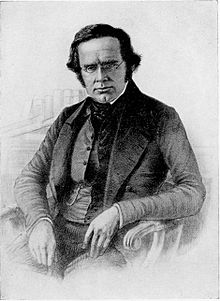Ottho Gerhard Heldring
| Ottho Gerhard Heldring | |
|---|---|

Ottho Gerhard Heldring c. 1848
|
|
| Born |
17 May 1804 Zevenaar, Netherlands |
| Died | 11 July 1876 (aged 72) Marienbad, Bohemia |
| Nationality | Dutch |
| Occupation | Preacher |
Krottho Gerhard Heldring (17 May 1804 – 11 July 1876) was a Dutch preacher and philanthropist who believed in justification through faith but also in social work. He was one of the early leaders of the Dutch temperance movement. He is known for establishing homes and schools for prostitutes wishing to start a new life and for vulnerable girls and young women.
Ottho Gerhard Heldring was born on 17 May 1804 at Zevenaar, the third son of Reverend Ottho Gerhard Heldring (1762–1841) and Louisa Geertruida Janssen (1764–1840). Heldring grew up in a pietist family environment. He went to Utrecht to study theology when he was sixteen, but was deeply disturbed by the humanistic and rationalistic theology he was exposed to there, and abandoned his studies after a spiritual crisis. He worked on the land for a period, then at his father's request became a pastor. He was admitted to this profession by the Hemmen municipality and confirmed on 25 March 1827. He would remain in this position for the rest of his life. At Christmas 1827 he experienced an inner revelation. He fully surrendered to Christ, and at the same time devoted himself to helping the poor.
On 24 October 1833 Heldring married Anna Elisabeth Deuffer Wiel (1807–73). They would have eight children. In 1833 he published a book on Nature and Man, and in 1935 published Winter Evening Readings of Pastor Gerhard, which discussed poor relief. As editor of Geldersche Volksalmanak (Arnhem 1835–1847) he showed his love for the archaeology and history of Gelderland. He acquired a reputation in literary circles for his simple and natural writing, with its expression of sympathy, contentment and piety. In the 1830s and 1840s Heldring pioneered the national fight against gin, which he considered more harmful than cholera. In 1838 he published an influential book that made a convincing case through statistics for the devastating effects of gin and suggested measures to fight it.
In the late 1930s Heldring began to speak publicly about justification of Christianity through faith. He appreciated the philanthropy of enlightened Christian associations such as Maatschappij tot Nut van 't Algemeen (the Society for General Public welfare), but saw excessive focus on good works as a denial of Christianity. On the other hand, he criticized orthodox believers who lacked any form of Christ-inspired social labor. He envisioned a form of orthodox Christianity that understood the requirement for social work. This led him to join and become a leader of the Réveil movement. From 1845–54 the Christelijke Vrienden (Christian Friends), inspired by what De Graaf has called an "orthodoxy of the heart", undertook an impressive program of social and church activities in which Heldring played a central role.
...
Wikipedia
